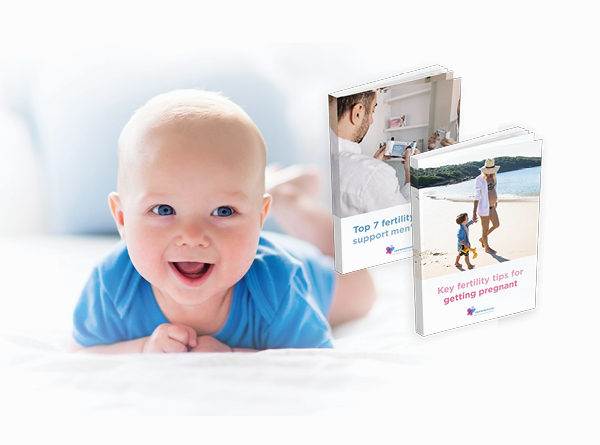A little planning can go a long way…
When you and your partner have made the decision to have a baby, it is important to put a plan into action and prepare for the wonderful journey ahead.
A good preconception plan to educate yourself about your fertility cycle and implementing recommended lifestyle changes optimises your chances of conceiving naturally.
Modifications to your diet, nutritional intake, exercise habits and lifestyle choices, will not only improve your overall health and wellbeing, but it may also improve your chances of natural conception.
For the ladies:
Did you know that excessive body weight in woman can indirectly impact egg quality and is considered to be a predisposing factor to irregular menstruation and medical conditions such as polycystic ovarian syndrome (PCOS), both of which can be responsible for infertility?
For the gentlemen:
Did you know that the quality and functioning of sperm may be affected by lifestyle factors such as smoking, poor diet, alcohol, and too little exercise?
Studies have shown that improved lifestyle choices can improve sperm in as little as three months.
Here are some key considerations:
Achieving & maintaining an optimal weight
For both men and women, maintaining a healthy weight is very important when you are trying to conceive. Body weight that is either too high or too low can result in hormone disruption and will impact natural conception. One of the best and simplest ways to determine whether you fall within or outside of the recommended weight range is to calculate your body mass index (BMI). The table below outlines the ideal and not so ideal body weight ranges, relative to the individuals height.
| Weight Classifications | BMI range |
|---|---|
| Underweight | <18.5 |
| Ideal weight | 18.5 - 29.9 |
| Overweight | 25 - 29.9 |
| Obese | >30 |
Studies have shown that a BMI of 25 or above is associated with greater difficulty conceiving. For women, an obese BMI classification is associated with increased medical risk to both you and your baby. These risks include gestational diabetes and hypotension in pregnancy, plus a higher rate of miscarriage. Lowering your body weight by as little as 5% to 10%, can improve the chances of conception.
Conversely, being underweight and an excessively low body fat percentage can lead to ovulation disorders and infertility also.
A healthy, balanced diet of fruit, leafy green vegetables and protein, combined with regular exercise will all contribute towards general wellbeing and help to maintain a healthy BMI weight.
Limit your alcohol intake
The jury is still out on how much alcohol is detrimental to fertility. The National Health and Medical Research Council (NHMRC) recommends that men and women trying to conceive drink no more than five standard drinks per week, with at least two alcohol-free days per week. The NHMRC recommends no drinking at all for women during pregnancy. This is due to the difficulty in knowing what is a safe level for a pregnant woman to consume. Since it is still unclear as to how much alcohol can affect fertility or pregnancy, the safest option would be to avoid it all together.
Smoking cessation
It is universally accepted that smoking is not good for you and is contraindicated when trying to conceive or during pregnancy. There is strong evidence that smoking adversely affects male and female fertility.
For women who smoke or for those exposed to passive smoke, the length of time taken to conceive naturally is longer when compared to non-smokers. Smoking can also compromise success with fertility treatments and has been linked to a higher incidence of miscarriage and stillbirth.
For men, smoking is associated with reduced semen volume and abnormality in sperm structure, when compared to non-smokers or ex-smokers. Harmful constituents found in tobacco such as cadmium, nicotine, lead and radioactive elements may be directly toxic to sperm and sperm DNA.
If you are a smoker and need some advice on how to quit smoking, consult your family doctor about a smoking cessation program.
Start an exercise program
Maintaining an active lifestyle and taking part in regular exercise reduces the risk of some chronic health problems and improves general wellbeing. Moderate levels of exercise between four to five times per week will help you to maintain a healthy weight range and can also help to manage stress levels.
An antioxidant rich diet
Antioxidants are found in many foods such as citrus fruit, tomatoes, peppers, green vegetables like spinach, kale, broccoli, and nuts and seeds.
Antioxidants can act as scavengers removing any harmful free radicals that accumulate in our bodies through oxidative stress. Large studies have shown improvements in sperm health with antioxidant supplementation.
Have a preconception health assessment with your family doctor
A preconception assessment with your doctor helps to rule out or identify any potential risk factors that could affect your pregnancy and the baby.
A preconception health check includes:
- A comprehensive medical history
- A standard physical health assessment including height, weight and blood pressure
- An overview of lifestyle factors such as smoking, alcohol, diet and illicit drug use
- Investigation and management of any pre-existing medical disorders such as diabetes, epilepsy or thyroid disease
- A review of any prescription or OTC medications being used
- Screening for infections
- A vaccine schedule review
- Advice to commence folic acid supplementation to help protect
against spina bifida - Blood tests to rule out iron deficiencies, and assess the blood type
- Carrier screening tests for genetic abnormalities
- Urine analysis
At this appointment, smoking cessation strategies and weight loss plans can be discussed. If any of the tests or investigations uncover potential medical complications, your doctor can also advise you on other conception avenues.
Start a folic acid supplement
Ideally women who are thinking about having a baby or actively trying to conceive should start taking a 500mcg supplement of folic acid daily, at least month prior to conception.
Folic acid is a B group vitamin and is essential for neural tube development during the first 12 weeks of foetal growth. The conceiveplease™ Pre-conception and Pregnancy Vitamins contain 16 essential minerals and vitamins plus 500mcg of folic acid and 250mcg of iodine and per tablet.
References:
- The Fertility Society of Australia; Preconception Health Special Interest Group: Effects of caffeine, alcohol, and smoking on fertility.
- RANZCOG, Women and smoking. Available at: https://www.ranzcog.edu.au/RANZCOG_SITE/media/RANZCOG-MEDIA/Women's%20Health/Statement%20and%20guidelines/Clinical-Obstetrics/Women-and-Smoking-(C-Obs-53)-Review-November-2014.pdf?ext=.pdf . [Last accessed October, 2017].
- NHMRC. 2009 “Australian guidelines to reduce health risks from drinking alcohol”. Available at: https://www.nhmrc.gov.au/guidelines-publications/ds10. [Last accessed, October 2017].
- Hull M.G, North K et al. 2000. Delayed conception and active and passive smoking. Fertility and Sterility 74:725-733.
- British Medical Association 2004, Smoking and reproductive life, British Medical Association.
- Balen AH 2007, ‘Impact of obesity on female reproductive health: British Fertility Society, Policy & Practice Guidelines’, Human Fertility Vol 10 no 4, 195-206.
- Jensen TK; Hjollund NH, 1998, ‘Does moderate alcohol consumption affect fertility?’, British Medical Journal, Vol 317, no 7157.
- Wilson RD, Johnson JA, Wyatt P et al 2007, ‘Pre-conceptional Vitamin/Folic Acid Supplementation 2007: The use of folic acid in combination with a multivitamin supplement for the prevention of neural tube defects and other congenital anomalies’, Journal of Obstetrics and Gynaecology Canada, Dec;29(12): 1003-26.
Your pregnancy journey
Preparing for pregnancy
A good preconception plan to educate yourself about your fertility cycle and implementing recommended lifestyle changes optimises your chances of conceiving naturally.
Monitoring ovulation
In order to pinpoint your fertile window, you need to be aware of the length of your menstrual cycle. The average length of menstruation is 28 days.
During pregnancy
The female body will evolve dramatically within this time and there are many nutritional and lifestyle changes that will be necessary to meet the needs of a growing healthy foetus.
Download your FREE e-books for top fertility tips to help you get pregnant





